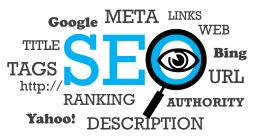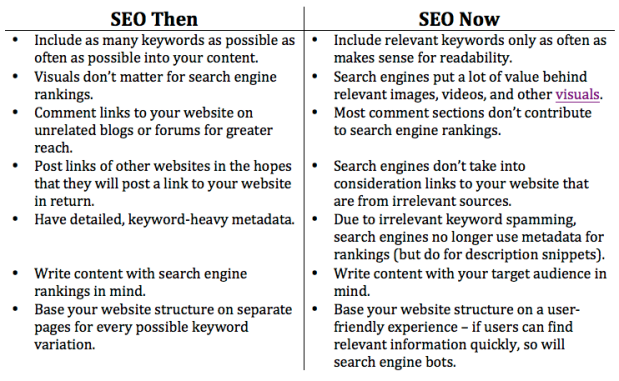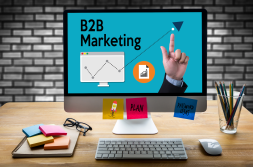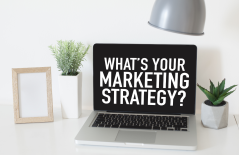 With 2018 now in full force, it’s likely you have your strategic business goals prepared and ready for execution. Hopefully, the marketing aspect of your business received just as much love during strategic planning sessions for this year, but in the off chance it didn’t, or if you’re looking to optimize your marketing plan for the new year, read on!
With 2018 now in full force, it’s likely you have your strategic business goals prepared and ready for execution. Hopefully, the marketing aspect of your business received just as much love during strategic planning sessions for this year, but in the off chance it didn’t, or if you’re looking to optimize your marketing plan for the new year, read on!
When setting your marketing goals for 2018, I highly encourage you to consider these points. In doing so, you’ll have a robust plan that is easily understood, integrative, and ready for execution:
- Identify what did and didn’t work in 2017
Like anything in life, it’s best to learn from your shortcomings; the same mentality should apply to your business and how you market it. Begin by reviewing any marketing or campaign-specific data you may have from the year prior. This data may stem from Google Analytics or any other web analytics tool your company may use, social media analytics, email marketing results and lead tracking (web or otherwise). Upon reviewing the data, ask yourself these questions:
- Where did these leads come from? Did they result from a campaign or organic search?
- Was the messaging tailored to a unique audience?
- Was my website, landing page, or collateral optimized for conversions?
- Did customers interact with my brand the way I intended them to? Did I follow-up with them as often as I should have?
You may notice that while you had great campaign ideas, the execution was off. Slight tweaks of the same campaign based on answers to the above questions could result in an entirely different outcome!
- Consider your resources
As small businesses, we often don’t have the luxury of having a marketing department or team. Your marketing team may only consist of a coordinator or manager, or perhaps even just yourself! Bearing that in mind, make 2018 the year you introduce automation to your business. With automation, you’ll provide your marketing personnel with more time to focus on tasks that really matter, such as strategic planning and business development.
Or, if finances permit, expand your marketing team. Get specific with what you need. Do you require a generalist who can complete as many different tasks as possible, or is a specialist of some sort what you require? You may consider hiring a marketing agency that has all of the above and more, and can be more cost-effective than hiring an additional full-time staff member.
- Be realistic
First things first, yes, all companies want to grow and make more money; however, it’s important to remain realistic with the amount of growth you achieve and how quickly you attain this growth. Remember, good marketing takes time. While you’ll want to see a direct impact on your ROI, the fact of the matter is, revenue growth from new leads and customers will not be noticed until the next quarter or even later on in the year; or, years to come. Of course, this all depends on the type of business you have and the industry you’re in, but the importance remains that you should be focused on building your funnel at this time.
What are you waiting for?
I too often hear from business owners how they require assistance with marketing their business, yet it somehow is always placed on the back burner. By setting your marketing goals now, you’ll have a clear and concise plan that you can refer to throughout the year. If you require assistance with developing a marketing plan or executing marketing tasks, give CreativeWorks Marketing a call today!
 Have you ever searched your business on Google and wondered why your website didn’t come up first? Are you frustrated that your competitor ranks better than you? As a business owner in today’s high-tech world, having an online presence is essential for the success of your business. But did you know that in order to reach your target audiences through search engines, you need to have a top-notch SEO strategy?
Have you ever searched your business on Google and wondered why your website didn’t come up first? Are you frustrated that your competitor ranks better than you? As a business owner in today’s high-tech world, having an online presence is essential for the success of your business. But did you know that in order to reach your target audiences through search engines, you need to have a top-notch SEO strategy?
 Marketing is all about ensuring your target audiences successfully receive your brand’s message. So how do you ensure your message isn’t misinterpreted? How do you protect your brand from backlash in today’s highly attentive market?
Marketing is all about ensuring your target audiences successfully receive your brand’s message. So how do you ensure your message isn’t misinterpreted? How do you protect your brand from backlash in today’s highly attentive market? As a business owner, you probably hear about the importance of branding all the time. However, I’ve seen many small business owners confuse selling their product with selling their brand. You already thoroughly understand your product, but since
As a business owner, you probably hear about the importance of branding all the time. However, I’ve seen many small business owners confuse selling their product with selling their brand. You already thoroughly understand your product, but since  If you have accessed social media or any news source recently, you are likely just as dismayed as I am to hear about Facebook’s recent data breach.
If you have accessed social media or any news source recently, you are likely just as dismayed as I am to hear about Facebook’s recent data breach. Congratulations, your company is approaching a significant milestone! This is cause for celebration. You’re hyped, your employees are hyped, but how can you turn this into a marketing opportunity that also gets your clients hyped?
Congratulations, your company is approaching a significant milestone! This is cause for celebration. You’re hyped, your employees are hyped, but how can you turn this into a marketing opportunity that also gets your clients hyped? It’s a question I hear often when meeting with small business owners: “Why should I hire a marketing agency over an internal resource?” Undoubtedly, it’s a fair question to ask, and one that I would encourage any small business owner to ask when seeking marketing expertise. The answer will be different for every business because each business has its own unique goals and challenges it faces.
It’s a question I hear often when meeting with small business owners: “Why should I hire a marketing agency over an internal resource?” Undoubtedly, it’s a fair question to ask, and one that I would encourage any small business owner to ask when seeking marketing expertise. The answer will be different for every business because each business has its own unique goals and challenges it faces. We’re already two months into 2018, and if your company has been playing the guessing game when it comes to marketing, it’s time to take action! Even if marketing wasn’t a focal point of your annual strategic sessions, or if you don’t have the time or resources to make a robust annual plan, there’s one thing you can do, in particular, to ensure your marketing is as effective as possible: create a quarterly marketing plan.
We’re already two months into 2018, and if your company has been playing the guessing game when it comes to marketing, it’s time to take action! Even if marketing wasn’t a focal point of your annual strategic sessions, or if you don’t have the time or resources to make a robust annual plan, there’s one thing you can do, in particular, to ensure your marketing is as effective as possible: create a quarterly marketing plan. If there’s one question I hear most often from business owners, it’s “how can you guarantee a ROI for marketing?” It’s a fair question, indeed, but one where the answer isn’t clear-cut. Undoubtedly, it’s good business sense to expect a return when you invest in something for your business; but when it comes to marketing, there are various factors business owners need to consider before axing a tactic that yields a low ROI.
If there’s one question I hear most often from business owners, it’s “how can you guarantee a ROI for marketing?” It’s a fair question, indeed, but one where the answer isn’t clear-cut. Undoubtedly, it’s good business sense to expect a return when you invest in something for your business; but when it comes to marketing, there are various factors business owners need to consider before axing a tactic that yields a low ROI. If you’re looking to keep up with the competition in your market, there’s no doubt about it; artificial intelligence (AI) is where you need to be. But what exactly does it mean, and how can you introduce it to your marketing mix? Introducing something new to your business can be intimidating, especially if it’s technology related, but AI is surely one of those things you don’t want to miss out on.
If you’re looking to keep up with the competition in your market, there’s no doubt about it; artificial intelligence (AI) is where you need to be. But what exactly does it mean, and how can you introduce it to your marketing mix? Introducing something new to your business can be intimidating, especially if it’s technology related, but AI is surely one of those things you don’t want to miss out on. With 2018 now in full force, it’s likely you have your strategic business goals prepared and ready for execution. Hopefully, the marketing aspect of your business received just as much love during strategic planning sessions for this year, but in the off chance it didn’t, or if you’re looking to optimize your marketing plan for the new year, read on!
With 2018 now in full force, it’s likely you have your strategic business goals prepared and ready for execution. Hopefully, the marketing aspect of your business received just as much love during strategic planning sessions for this year, but in the off chance it didn’t, or if you’re looking to optimize your marketing plan for the new year, read on!